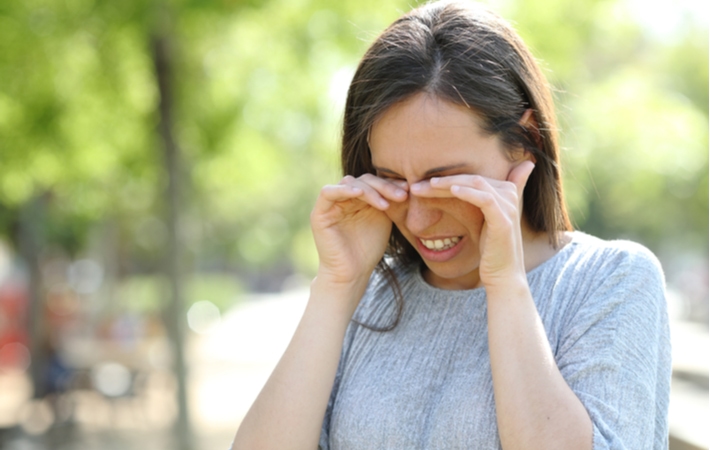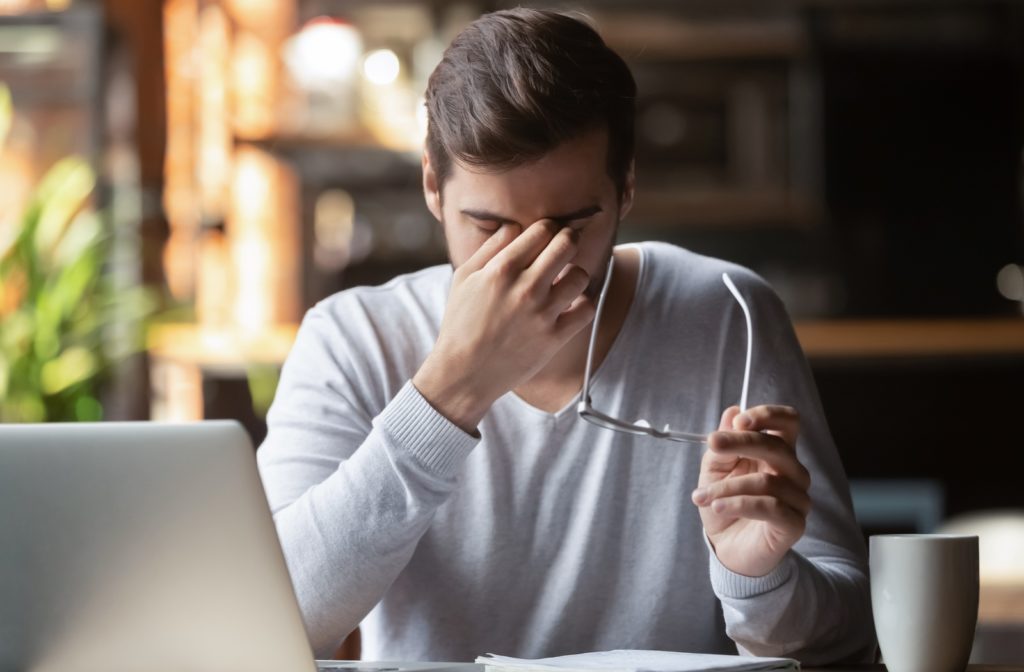Are your eyes feeling fatigued? Do your eyes look bloodshot even after a good night’s sleep? Does it feel like you’ve always got sand in your eyes? Then there’s a good chance you have dry eye syndrome.
More and more Americans are experiencing this eye condition. And while it’s usually not an eye emergency, dry eye can be very uncomfortable and negatively affect your lifestyle. Most of us have dry eyes every once in a while. But if your eyes constantly feel irritated, it’s time to do something about it.
Dry eye therapy helps your eyes feel more comfortable and allows you to focus on the rest of life. Annual eye exams allow your optometrist to diagnose your symptoms and are the best way to stay ahead of dry eye. Schedule an appointment with your eye doctor if you’re tired of sore, itchy eyes.
What is Dry Eye?
Dry eye is a condition that results from having inadequate tear production. Amongst other things, tears keep our eyes lubricated and contribute to vision comfort. Poor quality tears or not having enough tears can both contribute to a feeling of dry, irritated eyes.
Chronic dry eye is a common ailment, affecting over 16 million Americans. Understanding the causes and remedies for your dry eye requires testing and examination from your eye doctor.
The Role of Your Tears
Tears are produced by the lacrimal glands and the meibomian glands. The meibomian glands are located at the edge of your eyelids. Every time you blink those tears spread across the surface of your eyes. Tears function to lubricate your eyes, wash away debris, prevent potential infections, and help focus light accurately.
Your tears consist of 3 layers that all have a specific purpose. When the balance of these layers is not normal, it can leave your eyes exposed and subject to dryness.
Recognize Dry Eye Symptoms
Dry eye can be realized in many forms. Signs of dry eye syndrome can occur chronically or infrequently. It’s typical for dry eye symptoms to affect both eyes at the same time. If you are constantly strained with eye discomfort, it’s best to visit your eye doctor for an examination and diagnosis.
Pay special attention when multiple symptoms occur at the same time. The signs of dry eye syndrome include the following:
- Redness
- Stinging, scratching, or burning sensations
- Light sensitivity
- Watery eyes
- Stringy mucus near the eye
- Blurry vision
- Eye fatigue
- Feeling of grit in the eye

Causes of Dry Eye
The causes of eye dryness are numerous and sometimes hard to pinpoint. But understanding the factors that contribute to dry eye is important for finding an effective treatment. Some lifestyle decisions can lessen the negative impact of dry eye, but only a comprehensive eye exam can truly diagnose this condition.
Age & Gender
People over the age of 50 are more likely to report symptoms of dry eye. Senior eye exams are an effective practice for diagnosing dry eye syndrome and providing treatment solutions.
Women are more likely to develop dry eye syndrome, too. This is mostly due to hormonal changes through pregnancies and menopause. Hormonal changes can affect tear production and decrease lubrication of the eyes.
Environmental Factors
Harsh environmental conditions can contribute to tear evaporation. This can amplify the symptoms of dry eye. Be conscious of:
- Wind
- Smoke
- Dry climates
- Very cold climates
- Sun exposure
Underlying Health Conditions
Existing eye conditions or other health complications can increase your propensity for dry eyes. It’s important to communicate any underlying health issues during your annual eye exams. Some conditions associated with dry eye syndrome include:
- Blepharitis (inflamed eyelids)
- Rheumatoid Arthritis
- Sjögren’s Syndrome
- Diabetes
- Thyroid Complications
- Lupus
Lifestyle Contributions
Your eyes are an integral part of your body’s ecosystem and can be affected by many lifestyle factors. In some cases, dehydration may contribute to chronic dry eye. Diet is also important for maintaining healthy vision, specifically an intake of vitamin A.
Allergies, whether chronic or seasonal, tend to trigger dry eye symptoms. Allergy medication can actually worsen dry eye symptoms, so speak with your optometrist about solutions that can help both your eyes and your allergies.
There are several types of medications associated with dry eye syndrome and reduced tear production. The list includes:
- Antihistamines
- Decongestants
- Blood pressure medications
- Antidepressants
Digital Eye Strain
An ever-growing cause of dry eye is increased computer usage. This condition is known as digital eye strain or computer vision syndrome. The increased exposure to digital screens that comes with a modern lifestyle does have some consequences on our vision.
The average American spends over 7 hours a day staring at computers, cell phones, and tablets. Frankly, our eyes just can’t keep up. Understanding the impact that digital screens have on your eyes is important.
Always use the 20-20-20 rule during long sessions on a computer, and follow these guidelines to help prevent eye strain. But computer vision syndrome should also be addressed by an eye doctor.
If you notice consistent fatigue and dry eyes after using your digital devices, reach out to our office and schedule an appointment with your optometrist.
Relieve Your Eyes Today
Having dry eyes doesn’t need to mean a life of discomfort. There is a range of methods and treatments that your optometrist can recommend to treat your dry eye. The first step is taking action to relieve your symptoms by booking an eye exam.
The world of dry eye therapy is constantly developing new solutions to help Americans see more comfortably. From our TearLab® Osmolarity System to meibomian gland analysis, there are multiple modern solutions to address the cause and symptoms of your dry eyes. The Eye Care Team takes great pride in being at the forefront of dry eye therapy in Eastern Washington. If dry eye is irritating your vision and your lifestyle, take control by exploring treatment options with your eye doctor.



